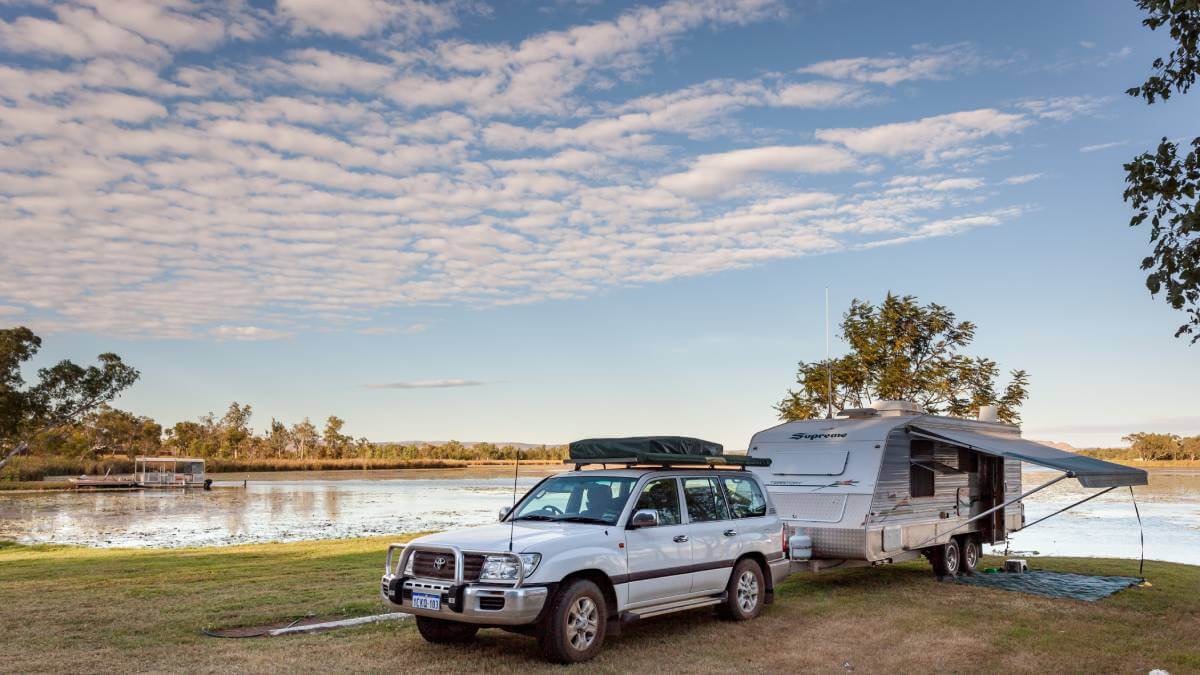If you’re thinking about becoming a grey nomad, Steve Perkin might be able to help.
•••
So you’ve retired, or are about to retire, and you’re wondering if becoming a grey nomad is right for you. This may help.
- Get out your car’s manual and see what it’s capable of towing. The manual – or the compliance plate inside the driver’s door – will give you the car’s Aggregate Trailer Mass (ATM) and Tare Weight. If, for example, your ATM is 3000 to 3500kg, then you can legally tow many caravans. If it’s 2000 to 2800kg, you have limitations on what you can tow and anything over 13ft could be a struggle. You need to know these things because if you have an accident, your insurance company will ask these questions and if you’re towing something too heavy for your vehicle, they won’t be paying out. Also, weight checks are rampant in some states. If it turns out that you need a bigger car for your preferred caravan, that may dull your enthusiasm.
- Work out what you’re willing to pay for a van. Minimum $20,000 will get you in the ballgame, $150,000 will make you king of the caravan park. Having a figure in mind and knowing your car’s towing capacity will help you filter the myriad options.
- Do a practice run. Hire or borrow a camper trailer or caravan and head off for a few days. You might fall in love with it or find four-star hotels more to your liking.
- Go to the caravan and camping expos. There are several each year and the bigger ones will feature all the big boys. And there are plenty of players in the game – more than 50 different manufacturers with multiple models by my latest research.
- Camper trailers are lower, lighter and cheaper than hybrids (a roof that pops up) or caravans, but they have a lot of canvas that flaps in strong winds. Hybrids or pop-tops are lower than caravans to tow, but there is a set-up time (five of 10 minutes). Most hybrids and camper trailers mean that you’ll spend a lot of your time outside cooking, eating and drinking. Caravans have most of life’s luxuries and they set up in no time. Weather is largely irrelevant.
- Make a list of your non-negotiables. For example, do you demand a television, air conditioning, internal ensuite, internal lounge, off-road capabilities, grey water tank, solar power, king or queen bed, bunks for grandkids, capacity to carry a boat, made in Australia and not China – the options are endless. Also decide whether you want something to tackle sandy tracks and river crossings, or are you sticking to the bitumen? Some vans will go where many others won’t.
- Whatever you choose, you will probably make concessions for reasons of price and size.
- Consider where your van will live. A caravan might not fit in your garage, whereas a hybrid or camper trailer may.
- You can start small and grow into it. By that I mean most campers start in tents, upgrade to a camper trailer and then, as they get older and seek more creature comforts, they progress to a hybrid or caravan. That process could take 10 to 15 years, but don’t fear it. We’ve nearly all done it or are doing it.
- Enjoy the journey. Researching your first buy, or the upgraded purchase, is an addictive, fun pastime. Embrace it.
It’s also a good idea to join some of the FaceBook groups dedicated to caravans, campers and travel, such as Hybrid Campers Australia and Planning A Lap of Australia – Hints and Tips. They’re full of useful information – and entertaining conversations.
Have you taken an long caravan trip? Do you have tips to share? Why not add them in the comments section below?
Also read: The must-have items for your next caravan trip


Very simplistic and dangerous assessment of towing capability stated here. It is much more complicated than just a towing rating. CVM, ATM, Tare, axle loadings and load balance are all critical. Go into it in huge detail and get help if you do not understand it. Overloading is everywhere and extremely easy to do. Your insurance is void if ANY of these numbers are over.
Please consider that a caravan has many disadvantages especially regarding weight specifications for the towing vehicle. Weight distribution and effects on towing. Set up time at parks etc ie reversing in.
For many a motor home is much more convenient, easier to drive, easier to set up especially if fully contained and many now are off the grid with solar and a good sized LifePO4 battery system. Drive in to park. switch off, park brake on then put the kettle on. After having a caravan and now a motorhome I would never go back to a caravan.
Prices vary but if you are a real hands on person then a Toyota Coaster or Mitsubishi Rosa provide a good shell in which you can build your own motorhome but then you can go up to $200,000 on a new motorhome..